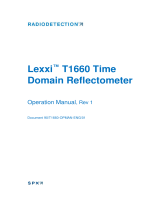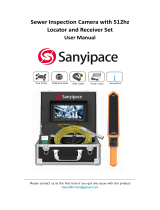S6 Microsonde
A micro sized sonde designed for use in very small diameter
applications – particularly microducts. Can be fitted to a
flexible rod using M5 female thread or jetted through duct.
Size: Length 83mm (3.27"), Diameter 6.4mm (0.25")
Location Depth: 2m (6.5')
Battery: CR425 – providing 8 hours continuous use
Signal: 33kHz continuous
Order codes: 10/SONDE-MICRO-33, comprising sonde,
flexible adaptor, 2 batteries, case and user guide
10/SONDE-MICRO-BATPACK – 10 CR425 batteries in case
S9 Minisonde
A mini sized sonde designed for use in small diameter
applications where diameter restricts the use of larger sondes.
Can be fitted to a flexible rod using M6 female thread.
Size: Length 138mm (5.4"), Diameter 9mm (0.35")
Location Depth: 4m (13')
Battery: CR535 – providing 8 hours continuous use
Signal: 33kHz continuous
Order codes: 10/SONDE-MINI-33, comprising sonde, 2 batteries,
case and user guide
10/SONDE-MINI-BATPACK – 10 CR535 batteries in case
Super Small Sonde (S13)
A very small sonde designed for use in small conduits and
ducts, and capable of passing around tighter bends. Used
with flexible rods or blown/pulled through pipe or duct.
Supplied as a kit.
Size: Diameter 12.7mm (0.5")
Length with plain end cap 70mm (2.75") with
M10 male end cap 87mm (3.43")
Location Depth: 2m (6.6')
Battery: 2 x V393 silver oxide
providing 8 hours
continuous use
Signal: 33kHz continuous
Pressure: 2 bar – 20m (65') of water
Order codes: 10/SONDE-S13-33, comprising sonde body,
M10 male threaded end cap, plain end cap,
2 batteries and case
10/SONDE-S13-BATPACK, pack of 10 V393 batteries















